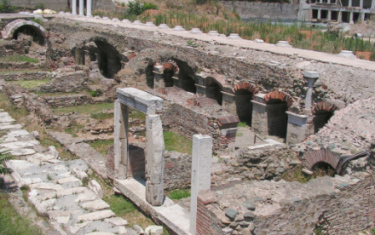Thessalonica was an autonomous part of the Kingdom of Macedon until 168 B.C. when it became a city of the Roman Republic. It soon grew to be a critical trading hub for the Roman Empire by facilitating the exchange of goods between Europe and Asia.
Thessalonica eventually became the capital city of the Roman district it was located in. The city contained a amphitheater where entertainment in the form of gladiatorial shows were held for the local citizens and also a circus were exhibited for the amusement of the citizens, and a circus where games for the public took place.
Paul Evangelizes the City
As part of his second missionary journey the Apostle Paul visits Thessalonica with Silas. He visits one of the chief Jewish synagogues in the area and for three consecutive Sabbaths explains why Jesus is the Old Testament prophesied Savior (Acts 17:2 - 4). Although many believe what he says certain Jews, envious of the Gospel's success, form a mob and start a riot (Acts 17:4 - 5).

The riotous Thessalonica crowd go to the house of Jason (where he was staying) seeking him and Silas. When they are not found the crowd drags Jason and some brethren to the local civil magistrate and accuses them of wrongdoing. In a short time, however, Jason and the brethren are let go.
And after journeying through Amphipolis and Apollonia, they came to Thessalonica, where there was a synagogue of the Jews. And as was the custom with Paul, he went in to them and for three Sabbaths reasoned with them from the Scriptures, Expounding and demonstrating that it was necessary for Christ to suffer and to rise from the dead, and testifying, "This Jesus, Whom I am proclaiming to you, is the Christ."
Now some of them were convinced, and joined themselves to Paul and Silas, including a great multitude of devout Greeks, and of the chief women not a few.
But the unbelieving Jews became envious and took to them certain evil men of the baser sort; and when they had gathered a huge crowd, they set the city in an uproar; and they assaulted the house of Jason, looking for Paul and Silas, to bring them out to the people.
And when they did not find them, they dragged Jason and certain brethren before the city magistrates, crying out, "Those who have set the whole world in confusion have come here also, Whom Jason has received; and these all do what is contrary to the decrees of Caesar, saying that there is another king, Jesus."
And they caused great agitation among the people and the city magistrates, who heard these things. But after taking security from Jason and the rest, they let them go (Acts 17:1 - 8, HBFV).
Sent Out of the City
Paul and Silas are soon sent by the brethren out of the city and to Berea.
Paul wrote, from the city of Corinth, his first letter to the church residing in Thessalonica in 50 A.D. He wrote a second letter to the area in 51 A.D. These two epistles are the first ones written by the apostle that are included in the New Testament. It is also interesting to note that the prevalence of Gentiles in Thessalonica was such that Paul's two letters do not use any quotations from the Old Testament.